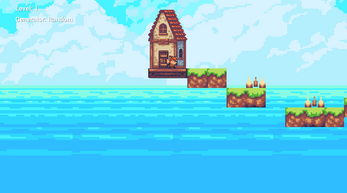Third Try
A downloadable experiment for Windows and macOS
A game experiment on dynamic difficulty using genetic algorithms. You can add difficulty on options with an eagle that follows you and attacks you. The rest of the options are at your own risk are were used as debugging options, still they may provide some fun levels.
Here the Abstract of the Thesis if you are after a more detailed explanation of everything:
This work uses procedural generation of content as a means of obtaining levels which, after being completed by the player, are analyzed in search of sequences that will be reused in future levels. The extracted sequences are processed using two versions of genetic algorithms, with and without crossover. The goal of this kind of algorithm is obtaining new sequences that turn out to be more difficult for the player and that are derived from the previous performance.
The reason behind the usage of genetic algorithms is mainly the potential they have for deriving solutions from previous ones. This potential is a product, in great part, of the mechanism of mutation and crossover which are guided by the fitness function to produce solutions that approximate an ideal. This combined with the ease of a player ́s data collection in a 2D game allowed enough information to be given to the algorithm in such a way that the solutions produced were in line with the difficulty scaling problem.
For the validation of the work, there were two experiments performed with players where their performance was measured using the same metrics used in the sequence recognition, this was compared with their perception of the difficulty of each completed level. Each player completed several levels with four different generators, a random used as a baseline, a heuristic-based (used only in the first experiment) and two versions of genetic algorithms. Through the analysis of the information gathered it was proved that the metrics used for determining the difficulty of sequences and levels were effective. In regards to the genetic generators they proved to have a lower difficulty curve than the random one, nevertheless this resulted to be positive because the random generator turned out to be highly frustrating to the players.
Lastly, between the two versions of the genetic algorithms, the one without crossover produced “more coherent levels”, this difference was attributed to the high degree of randomness that the crossover brings to solutions.
| Status | Released |
| Platforms | Windows, macOS |
| Author | Julian Spinelli |
| Genre | Platformer |
| Tags | 2d-platformer, Experimental, genetic-algorithm, Procedural Generation, thesis |
Download
Click download now to get access to the following files:


Comments
Log in with itch.io to leave a comment.
I will study your thesis as soon as I find spare time to read the details about the implementations of the genetic algorithms. I expected that the version that utilizes the crossover process would have better results. In any case, the usage of the genetic algorithm is exciting.